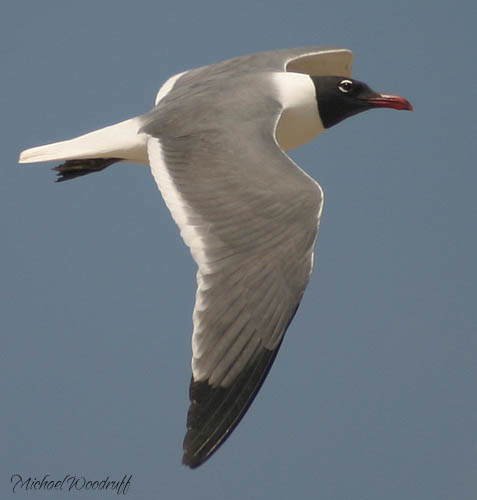BigRedBirder (talk | contribs) |
m (typo correction) |
||
| Line 28: | Line 28: | ||
Omnivorous - diet includes fish, insects, carrion, mollusks, eggs, worms, young birds, etc. Collects food by foraging on beaches and shallows; does not submerge in search of food like some other shorebirds. <br/> | Omnivorous - diet includes fish, insects, carrion, mollusks, eggs, worms, young birds, etc. Collects food by foraging on beaches and shallows; does not submerge in search of food like some other shorebirds. <br/> | ||
They are scavengers as well as hunting small prey. | They are scavengers as well as hunting small prey. | ||
| − | ====Breeding====A large nest is built of grass and placed on the ground. 3-4 greenish eggs are laid and incubated for about 21 days. | + | ====Breeding==== |
| + | A large nest is built of grass and placed on the ground. 3-4 greenish eggs are laid and incubated for about 21 days. | ||
==External Links== | ==External Links== | ||
{{GSearch|Larus+atricilla}} | {{GSearch|Larus+atricilla}} | ||
*[http://www.orientalbirdimages.org/birdimages.php?action=birdspecies&Bird_ID=2713&Bird_Image_ID=916&Bird_Family_ID=104 View more images of this species on Orientalbirdimages] | *[http://www.orientalbirdimages.org/birdimages.php?action=birdspecies&Bird_ID=2713&Bird_Image_ID=916&Bird_Family_ID=104 View more images of this species on Orientalbirdimages] | ||
[[Category:Birds]] | [[Category:Birds]] | ||
Revision as of 19:08, 28 June 2008
- Larus atricilla
Identification
L. 36-41 cm
W. 98-110 cm
Breeding
- Dark grey back and wings
- Black head
- Long red bill
Non-breeding
- Hood lost in winter
Distribution
Year-round resident on eastern and southern coastline of the U.S. from Maine to the southern tip of Texas. Winters in Mexico.
Taxonomy
Habitat
Coastal islands, saltmarshes and sand-dunes.
Behaviour
Often gathers in large flocks in beachfront areas on lawns, park areas, parking lots, etc.
Diet
Omnivorous - diet includes fish, insects, carrion, mollusks, eggs, worms, young birds, etc. Collects food by foraging on beaches and shallows; does not submerge in search of food like some other shorebirds.
They are scavengers as well as hunting small prey.
Breeding
A large nest is built of grass and placed on the ground. 3-4 greenish eggs are laid and incubated for about 21 days.





